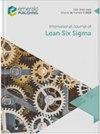As easy as OEE: enabling productivity improvement in schools by using overall equipment effectiveness as framework for classroom data analysis
IF 3.7
2区 工程技术
Q2 ENGINEERING, INDUSTRIAL
引用次数: 1
Abstract
Purpose The purpose of this paper was to develop a quantitative classroom observation method that is able to analyse the school day to identify Time-on-Task losses comprehensively and systematically, at a level of detail that can be used by teachers and principals to stimulate and focus practical improvement efforts. Design/methodology/approach The novel Time-on-Task Analysis (TOTA) model was developed by triangulating the conceptual framework of the Overall Equipment Effectiveness metric with the semantics and structure of the target domain. Once developed, the model was tested structurally against a time-series classroom observation data set, after which the resulting TOTA was presented to a sample of 52 education stakeholders, who then gave their perspectives of the analysis in a structured survey. Findings The ontological model was found to be accurate, complete and without conceptual incongruencies, and its output novel and useful by the sample of education stakeholders. Of the participants, 90.3% found the analysis to provide a new perspective, 94.2% reported that the analysis triggered improvement ideas and 80.8% thought that their school(s) could benefit from a TOTA study. Originality/value The TOTA model introduces a time-loss-focused perspective to the field of quantitative classroom observation studies, which is dominated by more sociologic- and pedagogic-focused topics. Its grounding in Overall Equipment Effectiveness also gives it a more detailed and systematic approach than the few Time-on-Task studies done to date, resulting in a model made for the “Gemba”: the school classroom.与OEE一样简单:通过使用整体设备有效性作为课堂数据分析的框架,提高学校的生产力
目的:本文的目的是开发一种定量的课堂观察方法,能够分析学校的一天,以全面和系统地确定时间在任务上的损失,在一定程度上可以被教师和校长用来激励和集中实际改进工作。设计/方法/方法新的任务时间分析(TOTA)模型是通过将整体设备有效性度量的概念框架与目标域的语义和结构进行三角测量而开发的。一旦开发出来,该模型就会针对时间序列课堂观察数据集进行结构测试,然后将结果TOTA呈现给52个教育利益相关者样本,然后他们在结构化调查中给出他们对分析的观点。本体论模型是准确的,完整的,没有概念上的不一致,其输出新颖和有用的教育利益相关者的样本。在参与者中,90.3%的人认为分析提供了一个新的视角,94.2%的人报告说分析引发了改进的想法,80.8%的人认为他们的学校可以从TOTA研究中受益。原创性/价值TOTA模型为定量课堂观察研究领域引入了一个以时间损失为重点的视角,该领域以社会学和教育学为重点的主题为主。它以整体设备效率为基础,也使它比迄今为止所做的为数不多的“按时完成任务”研究提供了更详细和系统的方法,从而形成了一个为“Gemba”(学校教室)制作的模型。
本文章由计算机程序翻译,如有差异,请以英文原文为准。
求助全文
约1分钟内获得全文
求助全文
来源期刊

International Journal of Lean Six Sigma
Engineering-Industrial and Manufacturing Engineering
CiteScore
8.90
自引率
15.00%
发文量
46
期刊介绍:
Launched in 2010, International Journal of Lean Six Sigma publishes original, empirical and review papers, case studies and theoretical frameworks or models related to Lean and Six Sigma methodologies. High quality submissions are sought from academics, researchers, practitioners and leading management consultants from around the world. Research, case studies and examples can be cited from manufacturing, service and public sectors. This includes manufacturing, health, financial services, local government, education, professional services, IT Services, transport, etc.
 求助内容:
求助内容: 应助结果提醒方式:
应助结果提醒方式:


